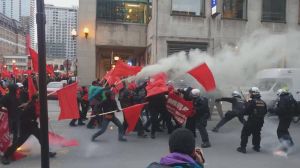The state of Texas is making headlines as it offers President-elect Donald Trump the use of 1,402 acres of land for what is anticipated to be the largest mass deportation initiative in U.S. history. This plot of land, located near the southern border, was recently purchased by Texas Land Commissioner Dawn Buckingham, who emphasized her commitment to supporting Trump’s plans for enforcement of immigration laws.
Comprising flat agricultural land, the site is conveniently situated near the border and has previously been associated with human trafficking and drug smuggling issues, raising speculation about its potential transformation. Buckingham's letter to Trump indicated her office's readiness to collaborate with federal agencies like the Department of Homeland Security and Immigration and Customs Enforcement (ICE) to facilitate erecting facilities for processing and detaining individuals targeted for deportation.
“What I care about is ensuring we have safe communities, and there’s no doubt we’re losing too many of our children to these violent criminals coming across the border,” Buckingham stated during her interview with Fox News. Her support aligns closely with Trump’s campaign promises to prioritize deporting individuals labeled as violent criminals, making clear her and many Texas officials’ readiness to be active partners in Trump's immigration policies.
Building on the momentum of his election, Trump has articulated his intent to remove nearly 20 million undocumented immigrants from the U.S., setting the stage for aggressive action once he takes office. Buckingham highlighted the ranch’s ease of development, citing its existing agricultural use as farming land, thereby expressing enthusiasm about its utility for constructing detention centers as necessary.
“Right now, it’s farmland; it’s flat, easy to build on, and accessible to international airports,” she noted, hinting at the practical capabilities of the land for supporting Trump's immigration enforcement strategies. Buckingham believes the land could serve as the backbone for handling the anticipated influx of deportations, claiming Texas is “more than happy to offer our resources” for this purpose.
Trump's confidant, appointed “border czar” Tom Homan, reaffirmed the urgency of their plans. He noted the intent to mobilize military resources not for enforcement actions but to support civil authorities during the deportation operations, effectively creating capacity for law enforcement officers to conduct more aggressive sweeps to identify and detain criminal illegal immigrants. Homan’s statements reflect the administration's broader strategy to expedite the processing and removal of those they deem dangerous.
The property, known as Sheerin Ranch, lies along the Rio Grande, approximately 35 miles west of McAllen, Texas. It is strategically located for transportation and access to border operations. The Texas General Land Office (TGLO) has confirmed the acquisition, along with plans by Buckingham to construct additional security measures like fortified walls, echoing Trump’s rhetoric about strengthening the southern border against illegal immigration.
Trump's agenda for tougher immigration policies has grown prominently since his 2024 campaign launch, where he has promised to declare immigration at the southern border as a national emergency. The aim, he says, is to bolster security and leverage every governmental tool available to return illegal migrants to their home countries.
Adding to the complexity, Texas Governor Greg Abbott continues to extend the state’s floating buoy barrier along the Rio Grande, anticipating potential surges of migrants reaching the border. Reports indicate new caravans, including at least 1,500 migrants, are en route from Mexico, intensifying scrutiny of border security measures.
Buckingham’s recent gestures, including the land offer, are not without controversy. Opponents argue these plans overlook the humanitarian aspects of immigration and focus solely on enforcement, raising concerns about how the state could manage large populations awaiting deportation.
While Buckingham remains resolute, declaring she stands for Texans’ safety and security, critics highlight the potential fallout from such stringent policies, including repercussions for families and communities affected by mass deportations. Some Democratic states signified their intent to resist cooperation, but Homan's response indicates the administration's readiness to enforce deportations regardless of local governance.
With anticipation running high as Trump prepares to take office and outline his plans, all eyes remain on Texas and its role as the newest frontline of America’s immigration battle. The offering of this massive ranch speaks volumes about the pro-deportation sentiment among specific officials, reflecting deeply held beliefs about maintaining order and safety at the border. The recent developments outline not only the immediacy of Trump’s expected actions but also the intense societal divisions surrounding immigration reform and enforcement.



